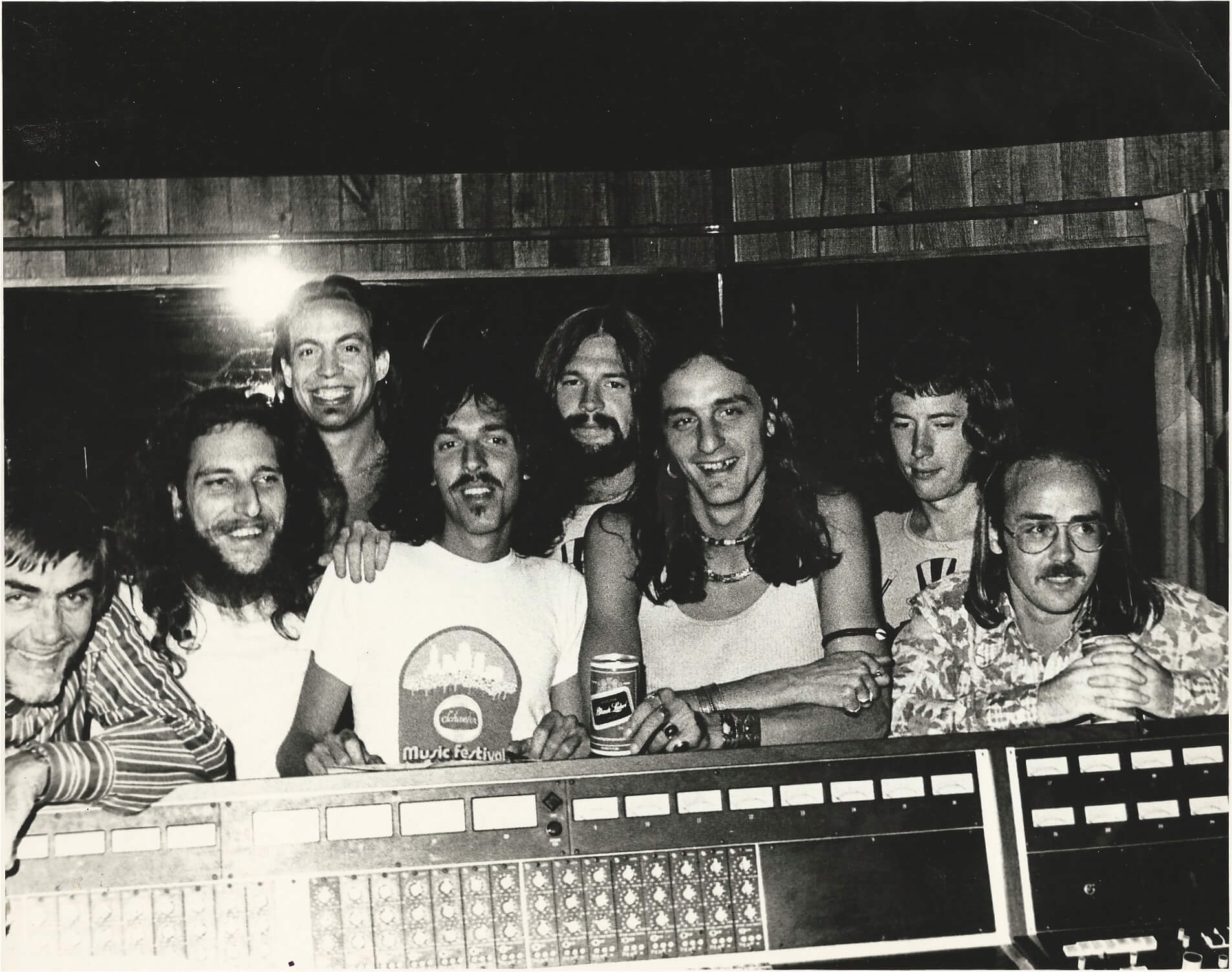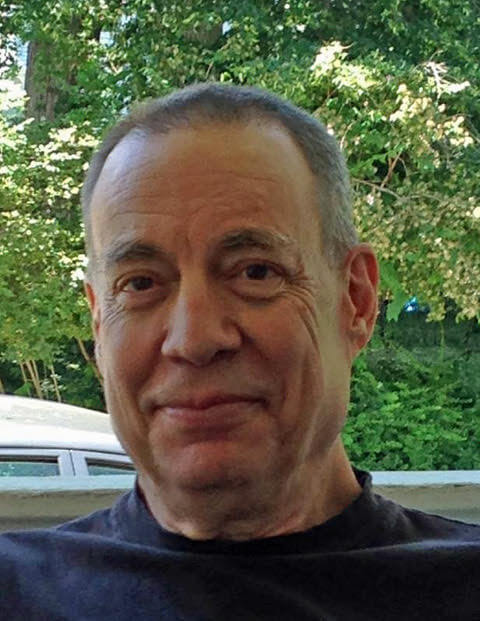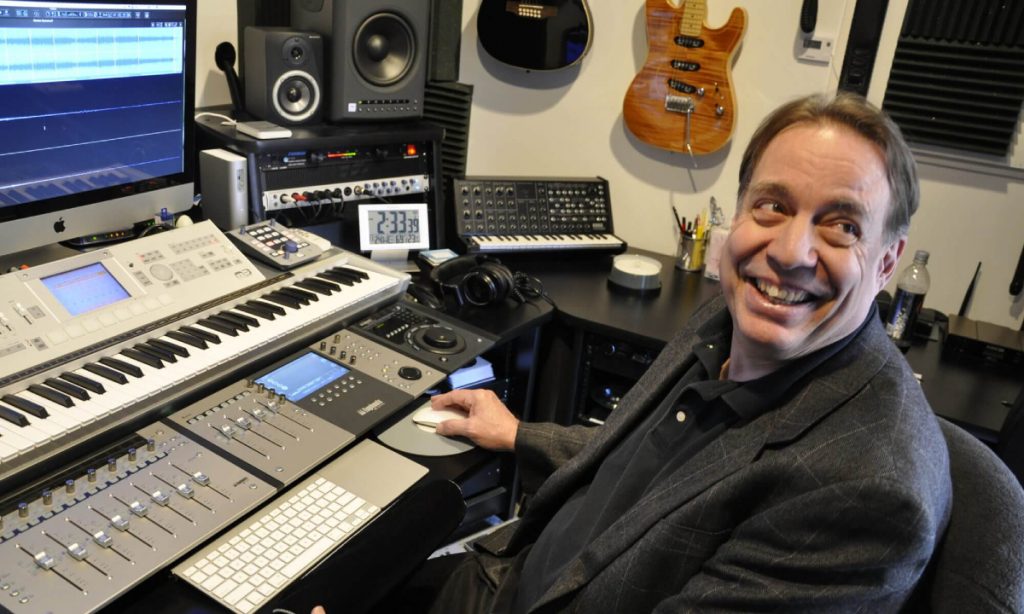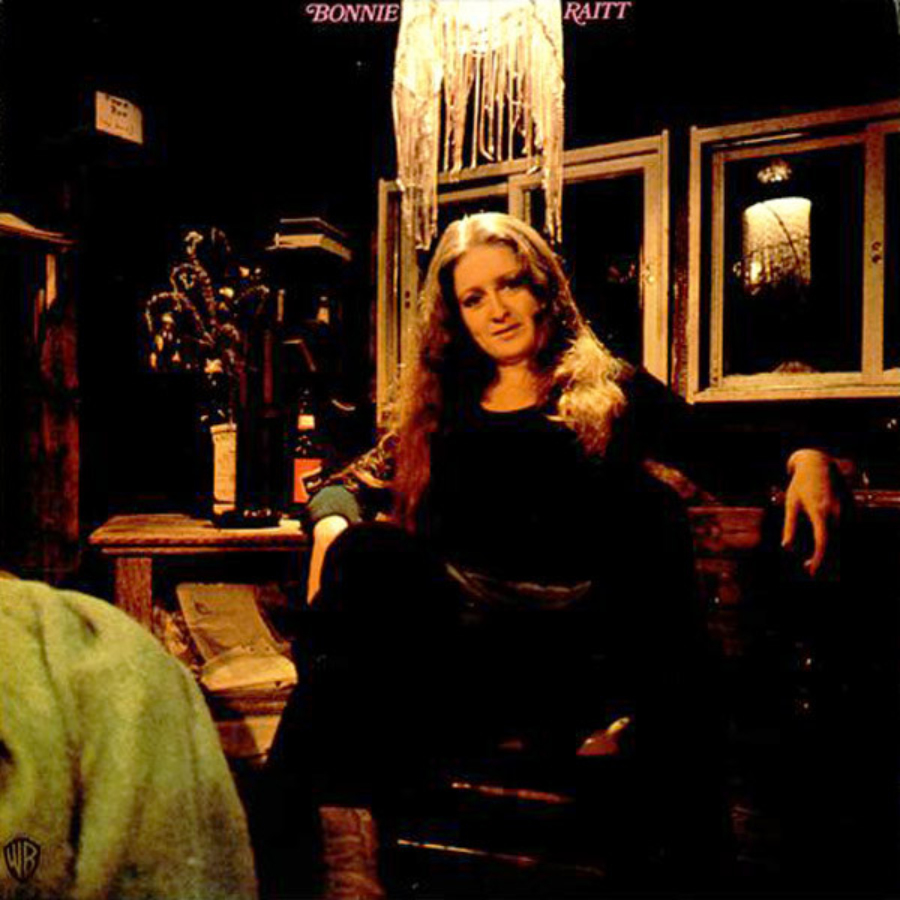Peter Bell is a producer, composer, guitarist and is a member of the Electronic Production and Design faculty at The Berklee College of Music. His commercial music compositions and productions include the themes to This Old House, New Yankee Workshop, Victory Garden, The ABC After School Special, the award-winning film Radio Cape Cod, and countless jingles and production tracks. Peter has produced tracks featuring many world-class musicians including: Livingston Taylor, Kate Taylor, Alex Taylor, Ray Greene, Rory Block, John Poussette-Dart, The New Kids on the Block, Tracey Bonham, Layla Hathaway, Rebecca Parris, Mick Goodrick, Mark Sandman (of Morphine), Patty Griffin, Bonnie Raitt (Public Service), and many others.
Bell’s guitar performance credits include projects with Bonnie Raitt, Susan Tedeschi, Kate Taylor, and James Montgomery. He recorded with Raitt on Warner Brothers and with The James Montgomery Band on Capricorn and Island Records. His awards include two Emmys, seven NEBA awards, and six ASCAP awards. Peter holds a Bachelor of Music in Jazz Composition and Arranging from The Berklee College of Music and a BA in government from Harvard.
Bell teaches his own Writing and Producing Music for Advertising course for Berklee Online and is the author of the recently published Creating Commercial Music. Peter is currently producing his own music, and that of others, with long-time collaborator David Mash under the name Bar of 2 Productions.

Brant Buckley:
Sounds like you started in blues playing with The James Montgomery Blues Band and Bonnie Raitt. Please explain.
Peter Bell:
Let me go back further. I have an odd and interesting background. My father was an economist and he was the director of the budget for the Kennedy administration. My dad had the job that Neera Tanden is about to get. After that, he was the administrator of USAID. I always thought that I was going to be a bureaucrat or a college professor because my dad was also a Harvard professor. I went to Harvard and studied government. The reason I ended up in music was I felt so alienated because of the Vietnam war.
I met Bonnie Raitt at Harvard when she was a freshman. One night I showed up at a gig in Somerville and she was the only other person in the place. She had a guitar. We had accidentally been double booked, so we played together and became fast friends. I ended up playing on her first Warner Brothers album. I drove her out to Minneapolis to make the album. It was so much fun and A.C. Reed was on the gig with Junior Wells. A.C. and Junior drove out in twin Cadillacs from Chicago. One was baby blue and the other one was pink. Junior and A.C. were just the sweetest guys. That album was produced by Willie Murphy and he had a band called Willie and the Bumblebees.
I had done a lot of listening to Delta Blues and Electric Blues. Willie introduced me to R & B artists like James Carr that I had never heard before and opened my ears to a lot of things. He had a horn band that was hot. Man, that was fun and I sat in with them. We did gigs in Minneapolis and then went up to Lake Minnetonka where we made the album in a barn. It was made on a Crown 4 track tape machine. It was a really good band but we were all just a bunch of hippies. Every once in a while, someone would goof up. Bonnie had to sing her parts perfectly every time as there was no overdubbing. She was perfect every-time. She sounded just like she sounds now, but younger. She had perfect intonation. I fell on the floor just like everybody else did the first time they heard her.
After this, I joined The James Montgomery Blues Band. We had a good following in Boston and we sold out the Orpheum Theatre twice in one night. In my own little way, I was sort of a rock star for a minute. When I walked down the street in Harvard Square people would recognize me and say, ‘Aren’t you Peter Bell from The James Montgomery Band?’ I would tell them I was, and they would say, ‘I saw them at Tanglewood.’ The band eventually worked its course. We made two records for Capricorn and one record for Island. The one we made for Island we recorded in Allen Toussaint’s studio in New Orleans, produced by Wardell Quezergue. We recorded another in Macon, Georgia at Capricorn studios, produced by Tom Dowd. It was incredibly fun for ten years and then it reached its end. We had a career like the band in the movie ‘Almost Famous.’ I kind of lived that movie.
After the band, I didn’t really know anything about music so I decided to go to Berklee. I knew how to play a minor seventh chord on the guitar, but I didn’t know what it was called. I went to Berklee and I loved it, I ate it for breakfast. I love music theory. I know people who are so talented and they do not need music theory. I am not one of them. I use music theory because I need to and I love it. As soon as I finished Berklee, I was offered a job to teach there. I did that for a couple of years. At the same time, I was finally finishing my Harvard Degree. I just wanted to get the degree.
Berklee has really changed since I went and taught there. In those days, it was a pretty tough gig for a teacher. I put in a lot of hours without a lot of reward. Today it’s a wonderful place to teach, but then I needed to make more money, so I stopped and started a Jingle studio. It became highly successful and I made so many jingles. A partner and I borrowed a bunch of money and created a studio on Newbury Street. That lasted for a number of years. Eventually, I moved my studio back home and I started teaching again. I created a jingle course for The Berklee Online School and I started teaching production on site at The Berklee College of Music. I learned production on the job. My engineer was a guy name Chris Rival who is a wonderful engineer and producer. I learned an awful lot from him. The way you make great jingles is to hire super talented people and collaborate with them. Lately, I have been making music for the love of it and I am doing that with David Mash.
What is the most important piece of information a jingle writer needs to know?
There is an awful lot that goes into being a successful jingle writer. There is a lot to the business and there is a lot to learn about production. The thing is that you have to be a jack of all trades. It’s a different kettle of fish if you are working directly with a small business in your area than if you are working for an ad agency. People expect you to be able to write and produce in every single genre. They will come to you and say something like I need a track that sounds like Beyonce. The next day they may need something that is New Age, Reggae, 40’s jazz band, or in the style of Santana. You must be able to quickly turn around and listen to any genre and be able to produce in that style. You have to make a simple appealing accessible melody that works.
Writing hit songs is not an easy thing to get good at. It is something that can be learned. You need amazing communication skills which is something that takes time to learn. One important tip is to always ask for a reference. If someone says they want slamming Blues, do not listen to that. Ask them if they like Muddy Waters, or Eric Clapton or Robert Johnson. Ask them what it means to them. You will often run into the limitations of the human language but a reference track is worth a thousand words. You need to ask them to play a piece of music along the lines of what they want.
In your opinion what is the coolest composition/theme you have written?
I have written a lot of jingles, but one of the things I like best is that I wrote the theme to ‘This Old House’ that ran for fifteen years. I also loved the work with wonderful musicians too. I worked with Bonnie, Liv Taylor, and Rory Block. The list is a mile long. The theme for ‘This Old House’ was a labor of love and we did it in a lot of different versions. The original brief was to write in the style of Fats Waller which was arranged by Billy Novick. Later, we did a Bluegrass version, a Western Swing version, a Calypso version, etc. I did an awful lot of stuff in the jingle studio. It was really fun and very lucrative.
Can you talk about your production company Bar Of 2 Productions?
I am working on my own album now. I concentrate on guitar and I do some singing. David Mash and I are co-arranging and co-producing. We are doing it all remotely. He has an offshoot to Bar Of 2 which is called Stefan. He is doing a lot of sophisticated electronic and orchestral fusion music. He has produced it by himself and I helped him mix it. He has been an important innovator when it comes to electronic music. He is one of the original experts in synthesis and in electronic music production.
I learned a lot from him. I am really excited about doing the album and we have also produced music for other people too. That is an ongoing thing. He is retired. It is nice to get back to making music just because we want to. I used to like having the intense pressure of the deadlines. It was pretty exciting but it is nice to sit back now and do music for the love of it.
Is the jingle art form dead? When did it slow down and where is it heading?
I think it is kind of like blues in the sense that it is going to come back. There is nothing like the human voice. It is not like it was back in the nineties when I was in my heyday. Every once in a while, you are going to hear a really great jingle and it is going to have legs. It’s true that the business has changed and the music business has morphed. The fact that everyone has the ability to produce music in their own living room now makes it unique.
When I started, I borrowed $60,000 to build my studio. Now I think you could do most of what we did for $6,000. I have a great rig at home and I enjoy using it. I feel sorry for people who can’t tour right now and aren’t making any money from streaming. I am not sure how they are getting by. I also wrote a book called ‘Creating Commercial Music.’ It’s published by Berklee Press and Hal Leonard. I think it is pretty good. If you can’t take my course, most of it is in the book.
The thing is, you won’t get to listen to me rant on and on about all my stories and give you feedback on all the assignments. I think the feedback is pretty valuable. I was excited to do the book and it was a ton of work and is not something that pays you by the hour. You can purchase my book and check out my online course.

How does a jingle writer protect his/her work and build credibility?
You have to protect yourself from two directions. If you are working for an agency, they are using Union Contracts. If you are not using Union Contracts you need a work for hire with everybody that collaborates with you for every job. I never made any money from the PRO’s (Performance Rights Agencies) from Jingles. I did however do well from the PRO’s from T.V. theme music from ‘This Old House’ and other shows. ASCAP is pretty good. There is a guy named Doug Wood who is on the ASCAP board and has done a lot to try and get royalties to people who do library music.
The whole thing about making money with commercial music is that it doesn’t make any sense. I call it Disneyland. Sometimes you make a lot more money than you expect and sometimes you make much less money than you expect. A lot of times it is not very much in your control. When people ask me about my rate, I always ask them what their budget is. I have made $500 for a week and I have made $35,000 for an afternoon. It just doesn’t make any sense. I cannot say my rate is one or the other. In this business you get paid for the lifetime of preparation that goes into every production.
What’s next for Peter Bell?
I’m excited about my new album. At this point in my career, I really love teaching and I love my Berklee students. They are incredibly talented these days. Teaching them is extremely rewarding. Also, my partnership with David Mash is fantastic and I love creating music with him. My kids are thriving and they are both married and have kids My partner, Gilda Tuttlebee, and I have two awesome dogs, life is good.
*Feature image Talia Smith



